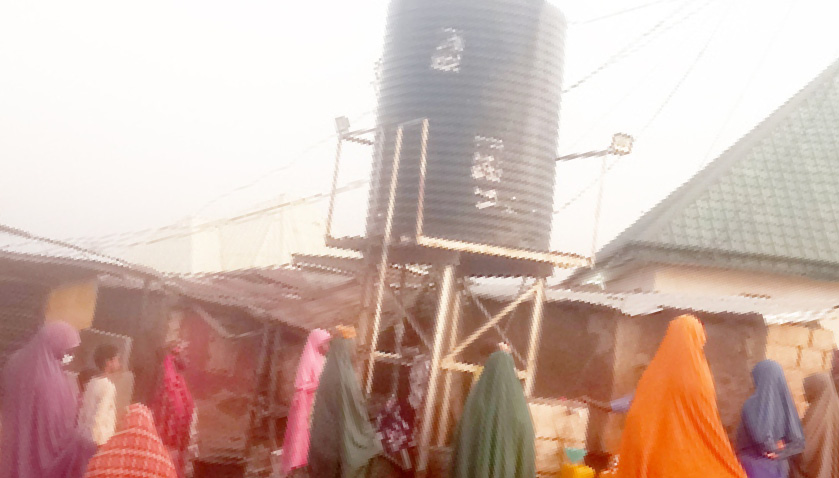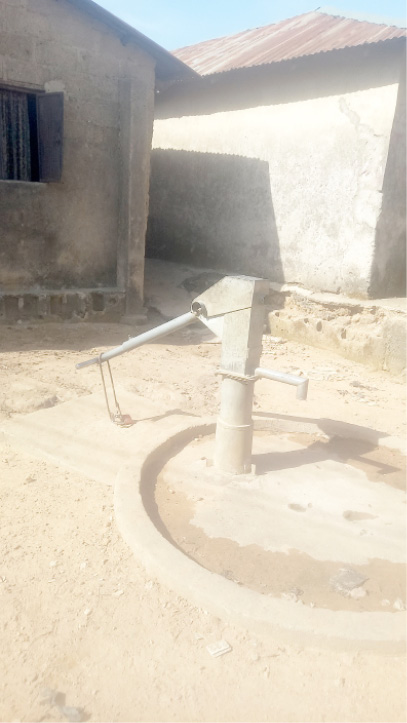Inside Abuja community where residents struggle, rely on vendors for water
Tunga Maje – a community located in Gwagwalada Area Council of the FCT, is one of the numerous communities in the FCT reported to lack potable water. Daily trust Saturday reports. Lack of access to potable water supply, a key human necessity, in Tunga Maje community has left residents with only one option, patronising […]

a cross section of the community
Tunga Maje – a community located in Gwagwalada Area Council of the FCT, is one of the numerous communities in the FCT reported to lack potable water. Daily trust Saturday reports.
Lack of access to potable water supply, a key human necessity, in Tunga Maje community has left residents with only one option, patronising water vendors amidst long queues.
The inability of communities to access potable water supply has been a major contributing factor in diarrheal outbreaks globally, the United Nations Children Fund (UNICEF) has published.
Residents told Daily Trust Saturday that they have been struggling with inadequate water supply and infrastructure for years, which has compelled then to purchase water from water vendors.
Reactions as Abuja socialite hosts 7-day birthday party abroad
How I taught my daughter the most difficult table
The community leader, Isiaku Na’anabi, said, “Water had been our basic challenge in this community for a long time until the government built two water reservoirs and a borehole in some areas. However, both water reservoir tanks are insufficient to meet the needs of the entire community, because we also lack the necessary power supply for consistent functionality.
“Whenever the borehole is damaged, some people used to repair it but they later stopped. So, we as a community also tried to repair it several times before it got out of hand. The borehole is no longer operational, leaving residents without a viable alternative.”

“Moreover, one of the representatives provided solar borehole for us but it was later removed at night by the same people who installed it, saying that they would come another day. Unfortunately, we have not seen them since then,” he added.
Na’annabi alleged that the government is aware of the difficulties the community is facing because they have been informing them time without number but there has not been positive response from them.
The residents are left to go to great lengths to source for water for their daily needs. Many have resorted to waking up early in the morning to buy water from water vendors.
Blessing Nmadu, 32, said “since I relocated to this community, I have been battling with water issues. I work in the city centre, so I wake up as early as 4.30am to buy water that I get from a water vendor which I think is unfair.
“Sometimes, I go to work late because I have to wait on a long queue for my turn to fetch water, this is the problem we have been facing for years. Others who can’t wait buy from water vendors popularly called Mai ruwa,” she added
Mardiyatu Adamu, a water vendor, said “I dug the borehole to ease the stress of getting water. Likewise, I collect money from people depending on the bucket size, and the lowest price is N20.”
She called on the FCT water board to intervene and address the issue urgently.
Daily Trust Saturday spotted water vendors crowding around a few boreholes in the areas to also fetch water for sale, which serves as a source of income for them.
Residents buy a wheelbarrow load of water at the rate of N500 while the water hawker buys at the rate of N200.
A water hawker, Ahmad Adamu, who has been in the business for two years said, “We sell a wheelbarrow load of 12 jerricans for N500 and that of 10 jerricans for N400. I make at least N1,500 every day depending on the level of patronage.”
However, this situation has become particularly challenging for those who do not have the financial means to invest in the water borehole business and who are not financially buoyant.
Abubakar Musa, a resident of Tunga Maje, expressed his concerns, highlighting that the available water tanks are owned by a few individuals and are primarily used for profit rather than serving the community’s needs.
He further emphasised that the high cost of water tanks and occasional power supply issues hinder widespread access to water.
While the issue continues to impact the daily lives of Tunga Maje residents, they urged the government to urgently intervene and address this pressing issue.
